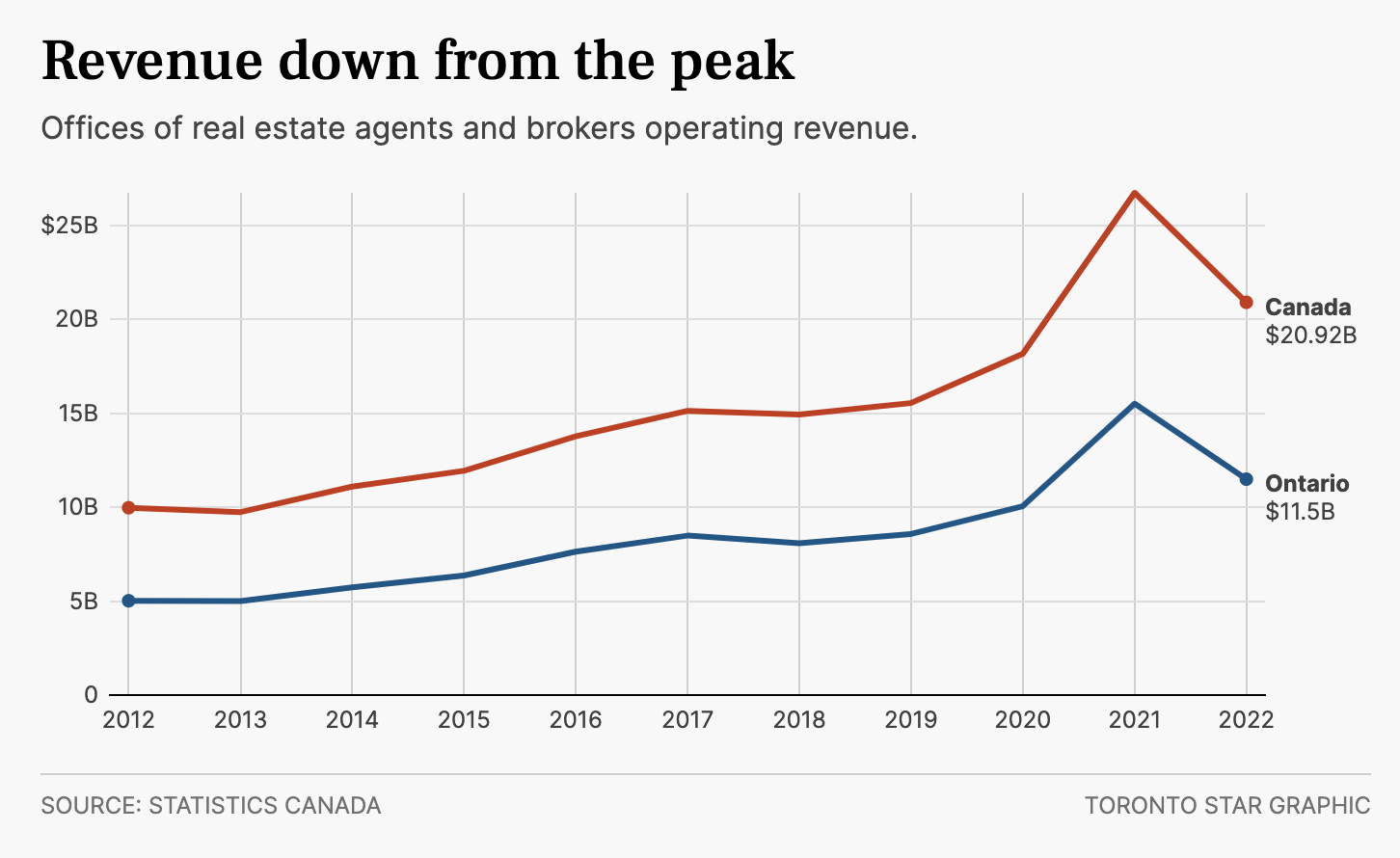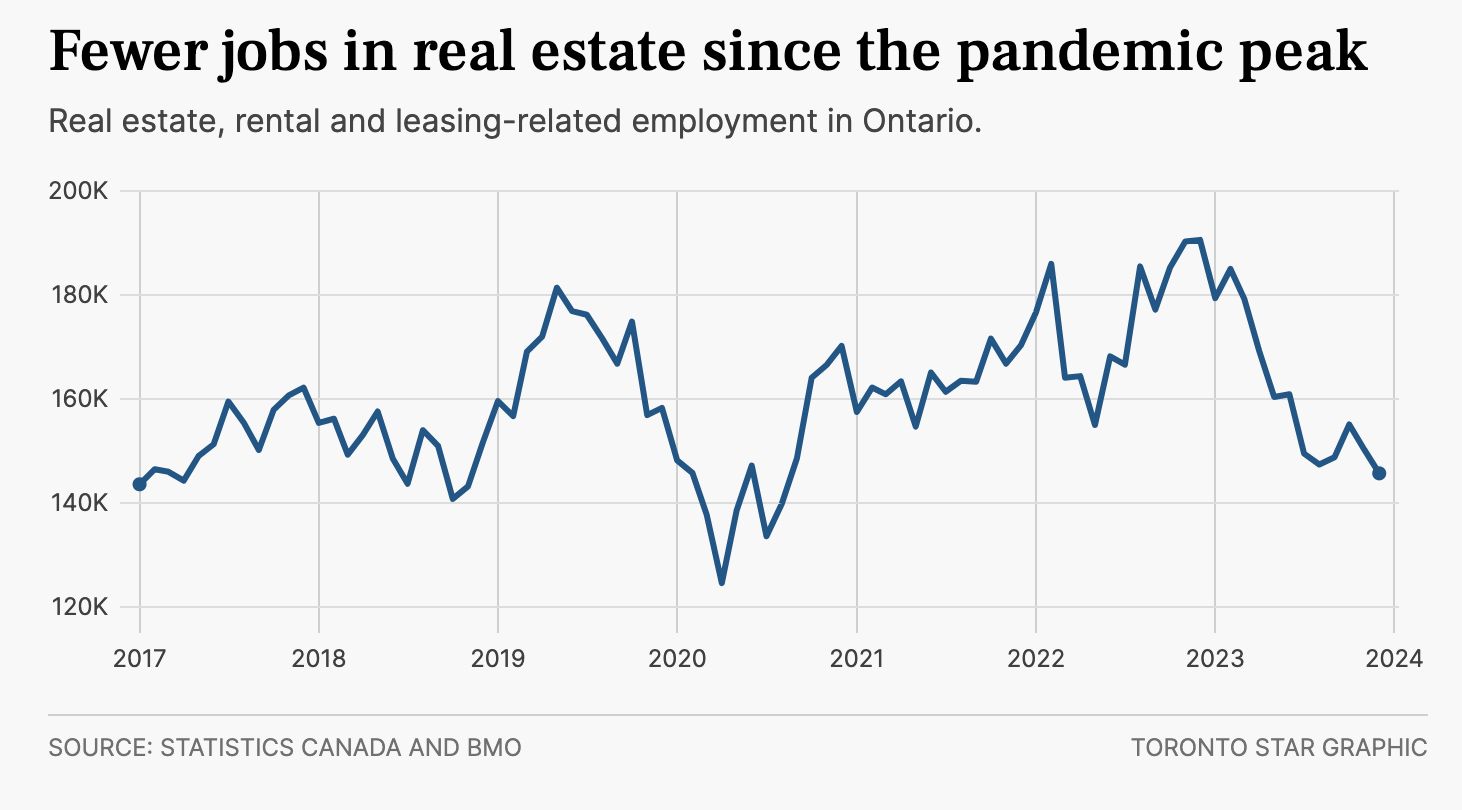
In a detailed examination by the Toronto Star, the Ontario real estate sector is currently experiencing a significant transformation. The article, titled “An exodus of 45,000 Ontario real estate workers has hit the industry since the slowdown — but some say Toronto still has too many agents,” authored by Clarrie Feinstein, a Business Reporter at Toronto Star, sheds light on the tumultuous journey of the real estate market in recent years.
Author: Clarrie Feinstein, Business Reporter at Toronto Star
Publication Date: Saturday, February 17, 2024
Source: Toronto Star

Cailey Heaps of Heaps Estrin Real Estate says a silver lining of the real estate downturn is that those who stayed in the professional have experience. “If you’re competing for a property with an agent who lacks the skill or knowledge and aren’t as aware of how to structure an offer that can be detrimental for the buyers.”
Lance McMillan/Toronto Star
Not a lot surprises Cailey Heaps when it comes to buying and selling houses. Having spent more than 25 years as a broker in Toronto’s competitive real estate landscape, she has navigated almost every type of market, adapting to the ebbs and flows of sales activity.
That’s why, when she was hired to sell a classic, three-bedroom brick house in midtown’s tony Davisville Village in 2021, she knew what to expect — it would be business as usual. But it wasn’t: she and her team were met with a frenzy of inquiries, endlessly ringing phones, back-to-back showings, and packed open houses.
“We saw a huge increase in the number of showings due to new agents entering the market,” said the CEO of the Heaps Estrin Real Estate Team, noting the house sold in record time with a selling price that was 125 per cent of asking.
Heaps said that pre-pandemic, a potential Toronto buyer would see maybe 20 home showings a week, but during the height of the pandemic that number rose to more than 100 in some cases. “The agents didn’t have the honed skills to vet the clients and curate what properties their clients saw.”
During the pandemic, realtors jumped into the market, chasing its rising prices and plump commissions, their numbers peaking in Ontario. Heaps and other experts say the influx did a disservice to buyers as many entered bidding wars they weren’t equipped for, resulting in inexperienced realtors entering negotiations they weren’t prepared to do.
But following the Bank of Canada’s rate hike campaign that led to Toronto experiencing its lowest number of sales in 23 years, many of the rookie realtors have jumped ship. Since the February 2022 peak, home prices have fallen by almost 20 per cent and earnings for Ontario realtors and brokers have dropped nearly 40 per cent under in two years. According to Statistics Canada, that has spurred an exodus of almost 45,000 real estate workers from the profession in Ontario alone.
And now, as the market is set to heat up again, hinged on the promise of Bank of Canada’s rate cuts, there’s concern inexperienced realtors will re-enter the market, impacting opportunities for buyers.
“It’s the buyers who are affected at the end of the day,” Heaps said.

Toronto’s real estate market was “scalding hot” in 2021, said Douglas Porter, chief economist and managing director of BMO Financial Group, with revenues for real estate agents and brokers in Canada hitting a record $26.7 billion.
But according to Statistics Canada, operating revenue for Canadian real estate agents and brokers fell by 21.8 per cent from 2021 to 2022. Ontario, which accounts for the largest share of operating revenue nationally, at 55 per cent, fell by 25.9 per cent in 2022. From the 2021 peak to the 2023 trough, Ontario realtors and brokers lost close to 40 per cent of their earnings, said Daniel Foch, a Toronto-based realtor and director of economic research with RARE Real Estate.
The Toronto Regional Real Estate Board (TRREB) — Canada’s largest real estate board — has 73,000 licensed real estate brokers and salespeople, but in 2023 only 65,000 sales were completed. And in 2024, the board projects 77,000 sales for the year.
While there was a lag in revenue impact on job numbers, Ontario employment for realtors, brokers, property management leasing and office staff peaked at 190,600 in December 2022 and dropped to 145,700 in December 2023, according to StatCan’s Labour Force Survey.
Because of the potential to earn substantial commissions from a few sales, many who work in real estate are self-employed and work part time, said Brendon Bernard, senior economist with hiring website Indeed, and they took a bigger hit during the market downturn when sales ground to a halt.
When looking at hours worked among those self-employed, they were down 20 per cent in the fourth quarter of 2023 compared to the same period in 2021, Bernard said.
Once the Bank of Canada began its rate hike campaign, the industry “cooled down,” said Porter, which had an outsized effect on Ontario’s economy.
“Ontario’s economy is sensitive to the real estate sector for good and bad,” he said. “The nature of the industry is to be cyclical and we can have some pretty big swings.”
Compared to other provinces and territories, and even the U.S., Ontario and B.C. are more reliant on real estate, Porter said, which impacts the province’s employment rate significantly.
“Ontario did tower above the rest of the country for real estate,” Porter said, “it had the biggest run up in prices and therefore the biggest correction since the pandemic.”
Unemployment in Ontario hit 6.2 per cent in January 2024, which is a “worse deterioration” compared to the national 5.7 per cent figure, which can, in part, be attributed to the job losses in real estate.
“Many of these self-employed workers have other jobs and work on and off throughout the year,” Bernard said. The number of job postings have decreased after strong gains in the pandemic, he added, although realtors and brokers employed in office jobs have more steady employment.
‘The market is still too crowded’
Toronto has the highest number of realtors per capita in the world. The market is so crowded that the average number of deals per realtor is now less than 1.5, said Foch.
“The market is still too crowded,” Foch said. “There is a high chance that a realtor may only be doing one deal, and this means clients are working with people who aren’t necessarily experienced with transactions or intimately in touch with the market.”
Thousands of Canadians enter real estate as a part-time gig, lured by the promise of flexible hours, high commissions, and a flashy lifestyle, said Christopher Alexander, Re/Max Canada president. “But the truth is 90 per cent of realtors give up within five years. Generally speaking, at most real estate boards, just 15 to 20 per cent of agents do 80 to 85 per cent of deals.”
In some ways the pandemic helped weed out the realtors and brokers who hardly work, experts say, allowing the experienced, hardworking cohort to gain more clients.

“True success in real estate demands considerable effort, expertise, and dedication and is very much a long-term career,” Heaps said.
“The field is much more complex and demanding than often perceived, requiring a deep understanding of the market and negotiation skills. The people who stayed in the business and were able to be resilient have been in it for some time.”
Fears of a realtor floodgate reopening
While the market is expected to pick up this year when the Bank of Canada cuts rates, it won’t rebound to pandemic levels, predicts BMO’s Porter.
“It’s dangerous to benchmark ourselves to what happened 2021 and 2022” as those were abnormal years for real estate and the economy at large, he said. “It takes time on the employment front for jobs to return and there will be a bit of a delay with a pickup of activity in the sector.”
Some real estate firms have forecast that prices in Toronto will increase by six per cent this year, closer to historical norms. Economists have also changed their forecast for when the Bank of Canada will cut rates, which is now likely to be midsummer instead of spring, as inflation remains sticky.
There remains some concern though, that when rate cuts occur, especially in desirable markets such as Toronto, realtors who have taken a back seat in the market downturn will make a comeback — crowding the space once more, experts say. Already, bidding wars have returned in the GTA with more homes receiving multiple bids and selling over asking.
The Ontario government has made some strides to enact more rigorous standards in the real estate sector, said Re/Max’s Alexander. In particular, new legislative and regulatory standards were recently established under the Trust and Real Estate Services Act (TRESA), as phase two came into effect on Dec. 1, 2023.
The legislation allows sellers to opt into open bidding and binds agents to an enhanced code of ethics. It also grants the Real Estate Council of Ontario’s discipline committee the ability to suspend or revoke registrations for realtors and brokers and gives the organization the right to investigate realtors’ conduct to see if formal complaints need to be made.
“It’s good to have these professional standards in place,” Alexander said, “and to be more stringent in keeping your licence.”
It’s a step in the right direction because at the end of the day buyers don’t know the intricacies of the market, Heaps said, and need experienced realtors on their side.
“If you’re competing for a property with an agent who lacks the skill or knowledge and aren’t as aware of how to structure an offer that can be detrimental for the buyers.”
Correction — Feb. 19, 2024
This story has been updated to correct the fact the 45,000 workers who left real estate include property management for leasing and office staff not just realtors and brokers.
This article was originally published by the Toronto Star and is being shared on our blog to provide our readers with comprehensive insights into the current state of the Ontario real estate market. We aim to promote thoughtful discussion on the implications of these changes and encourage professional growth and awareness within our community.
For more in-depth analysis and to support the original journalism, please read the full article on the Toronto Star’s website.


